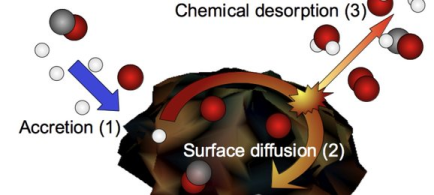Experimenteel bewijs voor grote invloed microscopisch kleine stofdeeltjes in het heelal
Een Frans/Nederlands team van astronomen, onder wie Stéphanie Cazaux van het Kapteyn Astronomical Institute, Rijksuniversiteit Groningen, heeft met laboratoriumproeven aangetoond dat moleculen op microscopisch kleine stofdeeltjes in de ruimte, direct in de gasfase kunnen komen. Dit resultaat kan belangrijke gevolgen hebben voor theorieën over de chemische samenstelling van het heelal en de manier waarop sterren worden gevormd. Het resultaat is vandaag online gepubliceerd op Nature Scientific Reports.

Al in de jaren '60 van de vorige eeuw was duidelijk dat in gebieden waar sterren en planeten worden geboren, stofdeeltjes belangrijk zijn voor de productie van de meest simpele tot zeer complexe moleculen die in het heelal voorkomen. Maar het precieze mechanisme - waardoor moleculen die op het oppervlak van de stofkorreltjes zijn gemaakt, onmiddellijk tot gas transformeren en weer de ruimte ingaan - was onbekend.
Om te onderzoeken hoe de moleculen op stofkorreltjes in de gasfase komen, hebben de astronomen in het lab de vorming van water op silicaten bestudeerd. Deze soort mineralen is gekozen omdat hiermee de stofkorreltjes in de ruimte zo goed mogelijk worden nagebootst. Eerst werd moleculair zuurstof (O2) op het oppervlak gebracht, dat was afgekoeld tot een zeer lage temperatuur van 10 graden Kelvin (-263 graden Celsius). Vervolgens werden waterstofatomen op hetzelfde oppervlak aangebracht, die daarna werden bedekt met O2. Uit metingen met een massaspectrometer bleek dat 90% van de zojuist gevormde moleculen, direct het oppervlak weer verlieten en gas vormden. Dit proces heet chemische desorptie.
Over desorptie is veel gespeculeerd, en het mechanisme is nu voor het eerst in het lab aangetoond. Het proces van desorptie is wel eerder in astrochemische modellen van stervorming meegenomen, maar met geschatte waarden. De ontdekking zal daarom gevolgen hebben voor stervormingstheorieën. De hoeveelheid gasmoleculen in een wolk die ineenstort onder zijn eigen gewicht om een ster te vormen, is namelijk bepalend voor de snelheid waarmee de stervorming plaatsvindt, het aantal sterren en hun uiteindelijke massa. “Onze experimenten laten zien dat de microscopisch kleine stofdeeltjes in het heelal een directe impact hebben op de chemie van astrofysische objecten”, zegt Cazaux. “Dit heeft grote consequenties voor de interpretatie en analyse van veel objecten in het heelal, maar ook voor ons begrip van stervorming.”
De experimenten zijn uitgevoerd op het LERMA-lab van de Universiteit van Cergy-Pontoise in Parijs.
Artikel: Dulieu, F. et al. How micron-sized dust particles determine the chemistry of our Universe. Sci. Rep. 3, 1338
http://www.nature.com/srep/2013/130226/srep01338/full/srep01338.html DOI:10.1038/srep01338 (2013)
Meer informatie:
Contact: Stephanie Cazaux, Kapteyn instituut (Rijksuniversiteit Groningen)
E-mail: cazaux astro.rug.nl
Meer nieuws
-
10 februari 2026
Waarom slechts een klein aantal planeten geschikt is voor leven
-
09 februari 2026
Kunnen we de aarde de andere kant op laten draaien?
